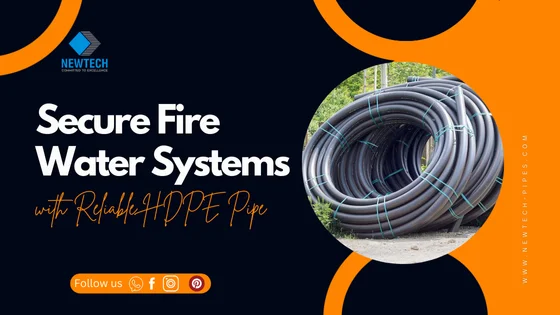Introduction of Fire Water Systems with Reliable HDPE Pipe
Fire water systems are a lifeline for building safety, designed to respond swiftly in moments of crisis. Whether it’s a residential complex or an industrial facility, fire water systems must function without failure. At the heart of these systems lies the reliability of the pipes transporting this vital resource. Enter HDPE (High-Density Polyethylene) pipes, a modern solution that offers superior durability, flexibility, and corrosion resistance. As fire hazards continue to evolve, securing these systems with reliable HDPE pipes is essential to safeguarding property and lives.
The Importance of Fire Water Systems in Modern Safety
In today’s world, where urbanization and industrial growth are accelerating, fire safety has become paramount. Fire water systems play a crucial role in extinguishing flames before they spiral out of control. These systems must be ready to spring into action at a moment’s notice, making reliability non-negotiable. A secure fire water system can mean the difference between a minor incident and a full-scale disaster.
The Role of HDPE Pipe in Securing Fire Water Systems
The piping network is the backbone of any fire water system. When considering materials, HDPE pipe emerges as an outstanding choice, offering not only long-term durability but also resistance to the wear and tear common in high-pressure environments. HDPE pipes ensure that water flow remains uninterrupted, particularly in critical moments.
Understanding Fire Water Systems
Overview of Fire Water Systems
A fire water system is an intricate assembly of pipes, pumps, and water sources designed to deliver water to fire suppression devices. Whether through sprinklers or hydrants, these systems are strategically placed to respond to fire outbreaks.
Critical Components of a Fire Water System
Beyond the pipes, fire water systems include pressure pumps, control valves, and water reservoirs. Each of these components must function in harmony to ensure rapid response. If any part of this system falters, the consequences can be dire.
How Fire Water Systems Prevent Catastrophic Fire Damage
When a fire breaks out, every second counts. Fire water systems are designed to suppress fires before they can spread. By delivering water directly to the source of the fire, they prevent small fires from escalating into uncontrollable blazes.
Why Pipe Selection Matters for Fire Water Systems
The Connection Between Pipe Quality and System Reliability
Pipe integrity is critical to the overall reliability of the fire water system. A leak or rupture at a crucial moment could lead to insufficient water flow, compromising the system’s effectiveness. HDPE pipe’s unparalleled strength ensures that fire water systems remain operational even in the most extreme conditions.
Common Materials Used in Fire Water Systems: Steel, PVC, and HDPE
Traditionally, materials like steel and PVC were used in fire water systems. While steel is known for its strength, it’s susceptible to corrosion. PVC, on the other hand, lacks the durability needed in high-pressure scenarios. HDPE, with its balance of strength, flexibility, and resistance, is rapidly becoming the material of choice.
What Makes HDPE Pipe Stand Out
HDPE Pipe: A Proven Choice for Safety and Durability
HDPE pipe is a robust material that has been tested in some of the harshest conditions. Its inherent properties make it ideal for fire water systems, offering a level of reliability that surpasses traditional piping materials.
Advantages of HDPE Pipe in Fire Water Applications
HDPE pipes boast impressive flexibility, corrosion resistance, and the ability to withstand high temperatures. In fire water systems, these advantages translate into fewer system failures and longer-lasting performance.
Durability and Strength of HDPE Pipe
How HDPE Pipe Resists Harsh Conditions
One of the key reasons HDPE pipe is favored for fire water systems is its ability to endure extreme temperatures, UV exposure, and high-pressure environments. Its non-reactive surface ensures that it can handle any chemical exposure or environmental stress.
Longevity of HDPE Pipe Under High Pressure and Temperature
HDPE pipes can operate at a wide range of temperatures, from sub-zero environments to high-heat settings. This longevity under pressure ensures that the system remains dependable over time, reducing the need for costly repairs or replacements.
Corrosion Resistance: A Key Benefit of HDPE Pipe
How HDPE Pipe Prevents Corrosion in Fire Water Systems
Unlike metal pipes, HDPE is immune to corrosion. This is crucial in fire water systems, where the pipes are often in contact with water and exposed to varying elements. Corrosion can weaken the pipes, but HDPE’s resistance ensures that the system remains intact.
Comparing HDPE with Traditional Metal Pipes for Corrosion Control
Metal pipes, particularly steel, are prone to rust and corrosion over time, leading to leaks and blockages. HDPE, on the other hand, remains impervious to rust, making it a superior choice for long-term system security.
Flexible and Lightweight: The Installation Benefits of HDPE Pipe
Why Flexibility Is Critical for Fire Water Systems
HDPE’s flexibility allows it to bend and adapt to changes in terrain, making it ideal for both underground and above-ground fire water systems. This flexibility minimizes the risk of cracks or breaks during installation and operation.
HDPE Pipe’s Ease of Transport and Installation
Due to its lightweight nature, HDPE pipe is easier to transport and install compared to metal pipes. This not only speeds up the installation process but also reduces overall labor costs.
Seamless Connections: HDPE Pipe Welding and Joint Integrity
The Importance of Seamless Pipe Joints in Fire Water Systems
In a fire water system, even a small leak can be disastrous. HDPE pipe’s welded joints provide a seamless connection, ensuring that the system remains leak-free and reliable under pressure.
How HDPE Pipe Ensures Leak-Proof Connections
HDPE pipes are typically connected through heat fusion, creating a strong bond that eliminates the possibility of water leakage. This method guarantees a reliable system that won’t fail when it’s needed the most.
Cost-Effectiveness of HDPE Pipe for Long-Term Fire Safety
Upfront Cost vs. Long-Term Savings with HDPE Pipe
While the initial investment in HDPE pipe may be higher than other materials, the long-term benefits, including reduced maintenance and a longer lifespan, make it a more cost-effective solution.
How HDPE Pipe Reduces Maintenance Costs in Fire Water Systems
With its resistance to corrosion, leaks, and pressure fluctuations, HDPE requires far less maintenance than traditional piping materials. This translates to lower repair costs and fewer system downtimes.
Environmental Sustainability of HDPE Pipe
HDPE Pipe: A Green Choice for Fire Water Systems
HDPE is not only reliable but also environmentally friendly. Its production process requires less energy than metal pipes, and its lightweight nature reduces transportation emissions.
Recyclability and Environmental Impact of HDPE Pipe
HDPE is fully recyclable, making it a sustainable choice for fire water systems. When the pipe reaches the end of its service life, it can be recycled and repurposed, reducing waste and environmental impact.
Compliance and Standards for HDPE Pipe in Fire Water Systems
Industry Standards HDPE Pipe Must Meet for Fire Protection
HDPE pipes must adhere to strict industry standards to ensure they meet the rigorous demands of fire water systems. These standards cover everything from pressure tolerance to fire resistance.
Why Regulatory Compliance Is Essential for Fire Safety
Ensuring that HDPE pipes comply with regulatory standards is crucial for the safety and legality of any fire water system. Compliance guarantees that the system will perform as expected in the event of a fire.
HDPE Pipe in Different Types of Fire Water Systems
Above-Ground vs. Underground Fire Water Systems: How HDPE Pipe Fits
HDPE’s flexibility and durability make it suitable for both above-ground and underground installations, providing a versatile solution for various fire water systems.
HDPE Pipe for Residential, Commercial, and Industrial Applications
Whether in residential settings or large-scale industrial facilities, HDPE pipe adapts to the unique demands of each environment, ensuring a reliable water supply for fire suppression.
Case Studies: HDPE Pipe in Action
Real-World Success Stories Using HDPE Pipe in Fire Water Systems
From high-rise buildings to manufacturing plants, HDPE pipes have proven their worth in real-world applications, providing secure and long-lasting fire water systems.
Lessons Learned from HDPE Pipe Installations in Fire Safety
Examining past installations can offer valuable insights into best practices and potential challenges when using HDPE pipe for fire water systems.
Maintenance and Monitoring of Fire Water Systems with HDPE Pipe
How to Maintain HDPE Pipe for Optimal Performance
Routine inspections and proactive maintenance are key to ensuring that HDPE pipes continue to perform at their best over the years.
Monitoring Techniques to Ensure Long-Lasting System Security
Advancements in monitoring technology now allow for real-time tracking of fire water system performance, helping to detect issues before they become serious problems.
Future Trends: HDPE Pipe and Advancements in Fire Water Systems
Technological Innovations in HDPE Pipe Manufacturing
New manufacturing techniques are making HDPE pipes even more durable and efficient, offering enhanced performance in fire water systems.
How HDPE Pipe Is Shaping the Future of Fire Safety
As fire safety regulations evolve, HDPE pipe continues to play a central role in modernizing fire water systems, providing the reliability and security that today’s buildings demand.
Conclusion
Why Reliable HDPE Pipe Is Essential for Secure Fire Water Systems
In the high-stakes world of fire safety, reliability is non-negotiable. HDPE pipe offers the perfect combination of strength, flexibility, and durability, ensuring that fire water systems remain secure and functional for decades.
The Ultimate Choice for Safety, Durability, and Peace of Mind
For those seeking a long-term solution to fire water system security, HDPE pipe stands as the ultimate choice, delivering unmatched peace of mind when it’s needed most.
FAQs About Secure Fire Water Systems
1. What is HDPE pipe, and why is it suitable for fire water systems?
HDPE (High-Density Polyethylene) pipe is a type of thermoplastic known for its strength, flexibility, and resistance to corrosion. It is ideal for fire water systems because it can withstand high pressure, harsh environmental conditions, and is highly durable.
2. How does HDPE pipe compare to traditional metal pipes?
Unlike metal pipes, HDPE is resistant to corrosion and does not rust over time, making it more reliable for long-term use in fire water systems. HDPE is also more flexible and easier to install than metal pipes.
3. Is HDPE pipe suitable for both underground and above-ground fire water systems?
Yes, HDPE pipe is flexible enough to be used in both underground and above-ground fire water systems, offering strength and durability in various installation environments.
4. What are the maintenance requirements for HDPE pipes in fire water systems?
HDPE pipes require minimal maintenance due to their resistance to corrosion and high durability. Routine inspections should still be conducted to ensure optimal system performance.
5. Are HDPE pipes environmentally friendly?
Yes, HDPE pipes are a sustainable choice. They are recyclable, and their lightweight nature reduces transportation emissions, making them an environmentally responsible option for fire water systems.
6. What is the lifespan of HDPE pipes in fire water systems?
HDPE pipes are known for their longevity and can last for decades without significant degradation, reducing the need for frequent replacements or repairs.
7. How are HDPE pipes joined in fire water systems?
HDPE pipes are typically joined using heat fusion, creating a seamless and leak-proof connection that enhances the reliability of the fire water system.
8. Can HDPE pipes withstand high temperatures in fire emergencies?
Yes, HDPE pipes are designed to operate in high-temperature environments and maintain their integrity under pressure, making them suitable for fire water systems.
9. How cost-effective are HDPE pipes compared to other materials?
Although the upfront cost of HDPE pipes may be higher than other materials, their long-term durability, low maintenance needs, and extended lifespan make them a cost-effective choice over time.
10. What standards must HDPE pipes meet for use in fire water systems?
HDPE pipes must comply with industry standards for pressure tolerance, fire resistance, and overall performance to ensure they meet the safety requirements of fire water systems.


